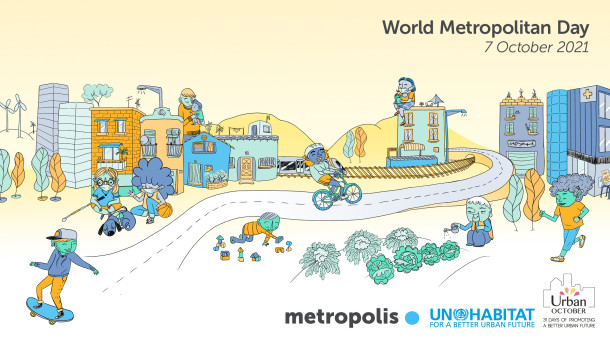
Caring metropolises: framing recovery for all
Over the past year, the Covid-19 pandemic has exposed areas of vulnerability in our urban areas and has deepened inequality, especially for women. Many urban communities, particularly vulnerable groups, lack access to adequate housing, public spaces, green spaces, services and infrastructure. These factors have contributed significantly to worsening health and wellbeing in metropolitan spaces. There is no doubt that the pandemic has brought to light the importance of creating caring societies that place people at the heart of decision-making and that reflect the diverse experiences in our metropolitan spaces.
Against this backdrop, the theme for this year’s World Metropolitan Day will be Resilience for all: creating caring metropolises beyond COVID-19, because it is impossible to create thriving and resilient communities without putting people at the heart of public policy.
Where communities live, work, play, run errands, socialise, and take care of each other does not end at a city’s borders. With 1.8 billion people living in metropolitan areas, urban spaces are uniquely positioned to bring about change and ensure wellbeing. Metropolitan areas provide opportunities, but they are also where the world’s biggest challenges—from urban growth to the climate emergency, and from gender inequality to spatial segregation—are most keenly felt.
The pandemic has shown that metropolitan leadership in global agendas and effective governance at the metropolitan level are more important than ever. Moving towards more caring and resilient societies requires understanding the needs and daily activities of different communities. In this sense, care—and its ethical, emotional, economic and political dimensions—plays a key role in steering urban transformation in a direction that promotes health for people and the planet.
Metropolis has been organising the World Metropolitan Day since 2018 to commemorate the signature of The Montréal Declaration on Metropolitan Areas, a milestone agreement that recognises the key role of metropolitan areas, signed during the Habitat III conference in Quito. World Metropolitan Day provides an opportunity for local, regional and metropolitan governments—and their communities—to promote collective action to build more equitable, resilient and prosperous metropolises.
For yet another year and in a shifting global landscape, Metropolis and UN-Habitat invite all levels of government, private companies, academic institutions, civil society, international organisations, city networks and urban leaders worldwide to join the movement by organising webinars, workshops, masterclasses from 1-6 October to take the metropolitan debate worldwide. In addition, celebrations will culminate in a Metropolis and UN-Habitat event organised on 7 October to exchange solutions on how to create more caring and resilient metropolitan spaces.
Check out the World Metropolitan Day 2021 webpage for more information.
Do you want to organise an event during World Metropolitan Day? Pitch your idea to Laura Valdés, Metropolis Policy and Research Officer.

